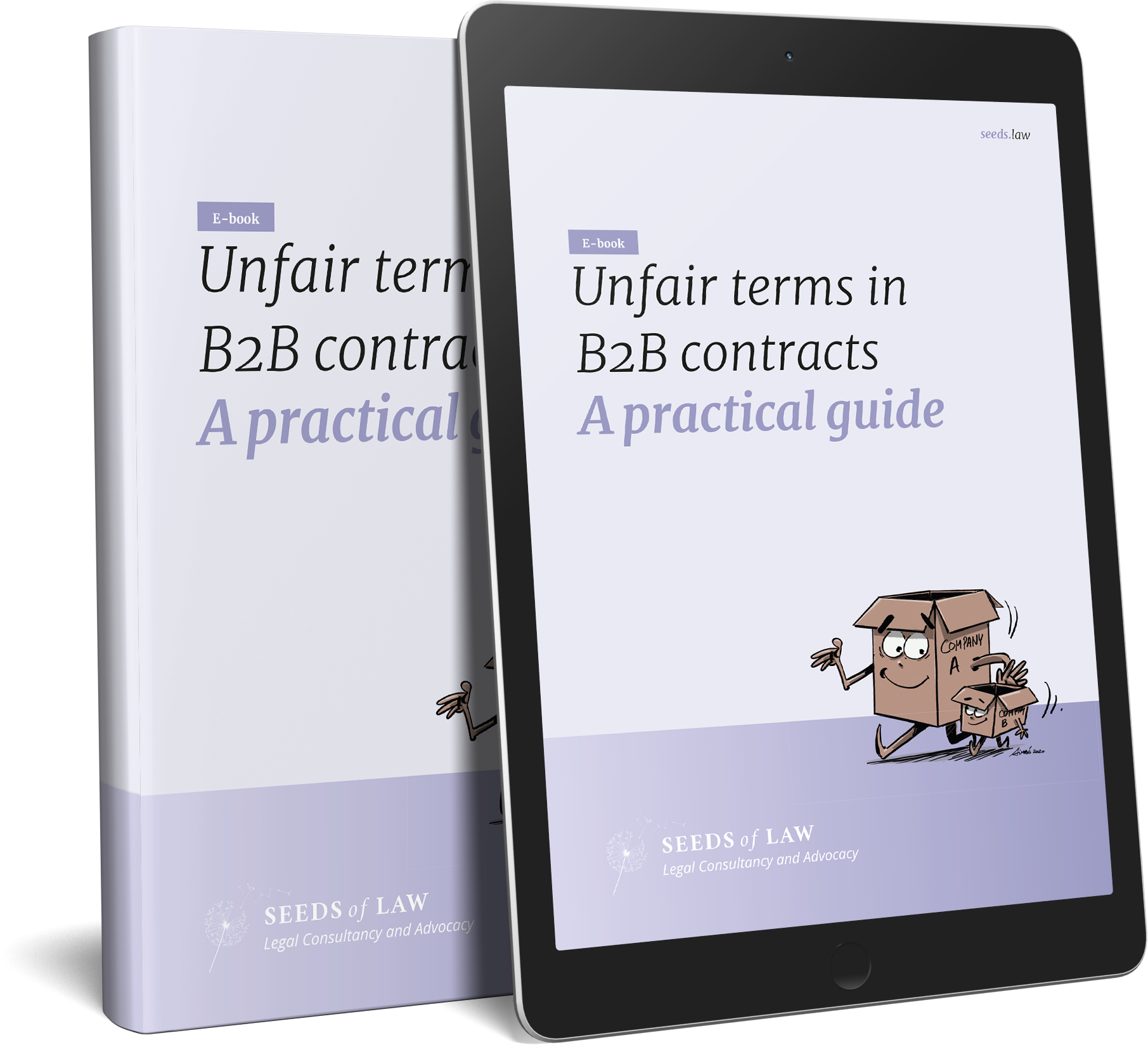- Finance and Banking , Commercial and Economic Law
- Sara Ataei - Toon Rummens - Steve Griess
- B2B , B2B contract , financial services , banking and insurance sector , bank , insurance company , exclusion of financial services
As the new B2B law applies to all types of contracts between businesses, banking and insurance contracts cannot escape it as well. However, there is an exception for financial services.
In this section of our practical guide, we list the consequences of the B2B law for companies in the banking and insurance sector.
You will notice that the B2B law will have an impact on this sector, and that it is therefore essential that their standard clauses are also examined.
1. What is it about?
When we talk about the banking and insurance sector, it is about financial players in the broad sense of the word, such as credit institutions, investment firms, insurance companies and so on. It is clear that the new B2B law will have a significant impact on contractual relations between companies and the settlement of commercial disputes. An analysis of the consequences of the regulation of unfair terms for companies in the banking and insurance sector is therefore of fundamental importance.
We then discuss the consequences of the new B2B law on a wide range of actors in the banking and insurance sector. First of all, we look at the notable exclusion of financial services in the new B2B law, after which we review some standard clauses in general banking and insurance conditions that may come within the scope of the B2B law and deserve a revision.
2. "Financial services" are excluded from the B2B law
The new B2B law has a very broad scope. However, there is an exception for two categories of contracts, namely for financial services and public procurement.
The B2B law, which concerns contracts between businesses, explicitly states that financial services fall outside its scope. Nevertheless, this exclusion deserves extra attention as it may create some confusion and ambiguity.
We note that companies in the banking and insurance sector cannot completely ignore the innovations introduced by the B2B law regarding the prohibition of unfair terms.
The reason for this is, first of all, that the B2B law also stipulates that it can be extended to financial services by Royal Decree.
The initial intention was not to exclude the two aforementioned sectors, but to take their specificity into account. The exception of financial services was made because of 'the complexity and specificity of financial services and the pre-eminently international nature of financial transactions'. Hence, the advice of the Financial Services and Markets Authority (FSMA) and the National Bank of Belgium (NNB) must be obtained before certain provisions can be declared applicable by royal decree.
Furthermore, we should not lose sight of the fact that companies in the banking and insurance world also offer many products and services that do not qualify as financial services. These products and services will then come within the scope of the B2B legislation.

3. How far does this exclusion extend?
It is crucial to consider the scope and contours of the exclusion of financial services.
3.1 Only regarding the unfair terms in contracts between enterprises
Although the two other prohibitions of the new B2B law, namely the prohibition of unfair B2B practices and the prohibition of abuse of economic dependency, are not discussed in this practical guide, it is nevertheless necessary to point out that financial services are covered by these two prohibitions.
First and foremost, this exclusion only relates to the provisions of the B2B law on contracts between enterprises, i.e. with regard to unfair B2B terms included in the Economic Law Code (hereafter ELC).
Financial services, and therefore the banking and insurance sectors, are covered by the prohibition of abuse of economic independence and unfair market practices.
3.2 What are financial services and what does this mean for this exclusion?
The ELC defines a 'financial service' as follows: "Any service of a banking nature or in the field of credit, insurance, individual pensions, investments and payments".
It can be deduced from the definition that it is relatively broad and covers all financial products within the meaning of the law on the Supervision of the Financial Sector and on Financial Services.
Nevertheless, not all agreements concluded with a bank or financial institution will be covered by this exclusion.
Some examples of agreements which do not fall under the definition of 'financial services' and are still subject to the B2B law are:
- Agreements serving to secure a credit (mortgage or collateral agreements);
- Distribution agreements concluded by banking and insurance companies with agents or brokers.
3.3 The exclusion from the application of the B2B law concerns financial services and not directly banks and insurance companies
As a result, on the one hand, the B2B law applies to the services supplied by the banking and insurance sector which are not of a financial nature. And on the other hand, the financial services of companies outside the banking and insurance sector are also excluded from the application of the B2B law.
3.3.1 The B2B law does apply to non-financial services in the banking and insurance sectors
The B2B law is applicable to non-financial services in the banking and insurance sectors, but not to their financial services.
In the event of the imposition of unfair terms for the supply of non-financial services, the protection of the law can therefore be invoked, even if this occurs in the banking and insurance sector. It is not because financial actors are often seen as the stronger party in contractual relationships that this is always the case. Some providers who have a quasi-monopoly position may impose unfair contractual conditions on their counterparty, in this case a financial actor.
It is therefore important for the banking and insurance sector to pay attention to the clauses imposed by professional clients when these sector offers non-financial services. In that case, the B2B law will apply in its entirety to the contractual relations between the actors in the financial world and their clients. The practical consequence of this will be that the banking and insurance sector is also advised to revise the general terms and conditions of the standard contracts for the cases in which it may come within the scope of the B2B legislation.
3.3.2 The B2B law also does not apply to financial services outside the banking and insurance sector
Finally, the question arises whether the B2B law applies to agreements on financial services concluded by enterprises which do not belong to the banking and insurance sector.
For example, a loan between two companies operating in the retail sector, and therefore not in the banking and insurance sector. Does such a contract fall outside the scope of the B2B law on unfair terms?
Based on the literal meaning of the law, we can conclude that such contracts are not explicitly excluded and therefore also fall outside the scope of the B2B law.
4. Some standard clauses in general banking and insurance conditions that deserve to be reviewed
Although the B2B law does not apply to financial services, we have already explained that a royal decree can stipulate that financial services do fall within its scope. Therefore, it is worth to anticipate this and to highlight some standard clauses from the banking and insurance sector which may fall within the scope of the B2B law on unfair terms between enterprises.
Businesses should take into account the consequences of the B2B law on their banking and insurance contracts to avoid problems in the future.
It is therefore important that standard terms in banking and insurance contracts that create an "apparent imbalance between the rights and obligations" between contracting companies be reviewed if they risk being qualified as unfair.
Below we list some standard clauses that may fall under the prohibition of the new B2B law, provided that the new B2B rules are extended to financial services by royal decree.
The clauses in question are the following:
- The waiver of recourse clause in an insurance policy, i.e. a clause whereby a party waives its right to recover the damage suffered from the person liable;
- The clause granting to one of the parties the right to unilaterally modify the tariff conditions;
- The declaration and acknowledgement clause whereby it is stated that both parties have taken note of all the general terms and conditions while this is not always the case;
- Clauses that place the burden of proof on one of the parties;
- The clause giving a lender the authority to seize the deposits of the person from whom he takes out a loan (set-off clause).
Therefore, please bear in mind that in the (near) future, it may be necessary to review the above-mentioned standard clauses and, if necessary, to adapt them to the B2B law.
5. Conclusion
The exclusion of financial services in the context of unfair terms in B2B contracts may cause confusion, as the regulation may be temporary in nature.
The exclusion of financial services is not a general exclusion of the banking and insurance sector but only of financial services.
As a result, the banking and insurance sector will not be able to completely escape the new B2B regulation. They will necessarily have to adapt and update their general terms and conditions, even before a specific regime is introduced for financial services.
But this also has the consequence that financial services outside the banking and insurance sector are excluded from the application of the B2B legislation. The same advice applies to them.
Finally, it is clear that it is also advisable for the banking and insurance sector to investigate the standard clauses which may be considered unfair and, if necessary, to bring them into line with the B2B legislation.
If you would like more information on this subject or assistance in reviewing your agreements, please do not hesitate to contact our experts via info@seeds.law.
False Read alsoDiscover our e-book about unfair terms in B2B contracts
In our e-book “Unfair terms in B2B contracts” you will discover a number of interesting tips to familiarize yourself with the new principles of the B2B law.




